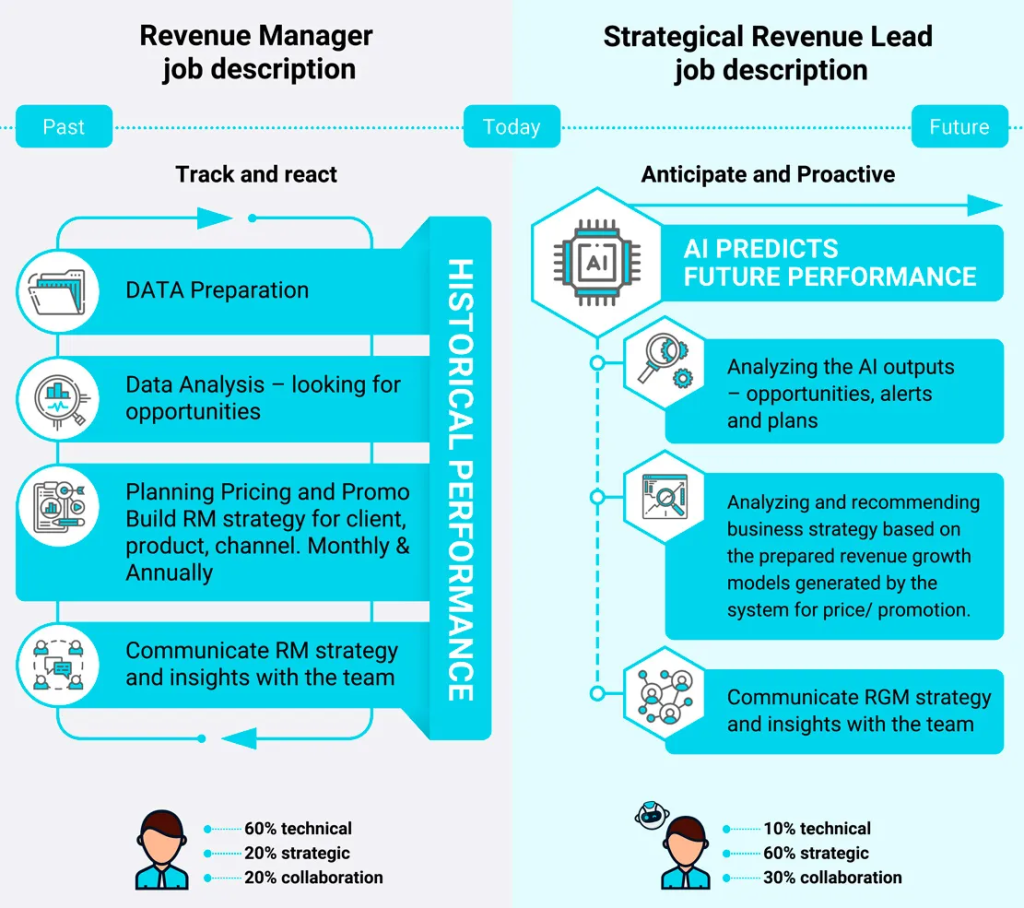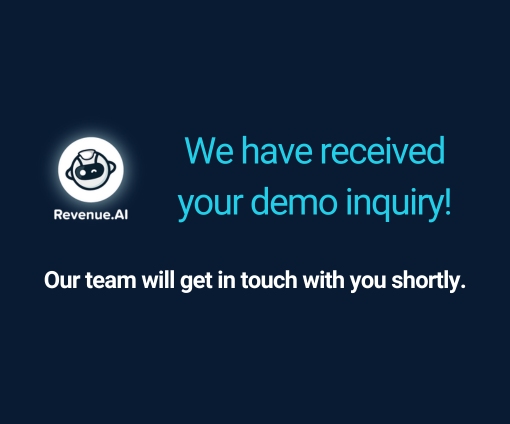The role of revenue manager is changing in CPG organizations.
Remember that old chestnut of an interview question, the one everyone always dreaded: where do you see yourself in 5 years’ time?
What if you were asked that question now? Not in the context of how you will develop professionally and the kind of job you’ll be doing – hopefully further up the corporate ladder; but how your chosen field is going to change. Does it fill you with dread? I’m here to tell you why it shouldn’t.
Firstly, let’s talk data. There is so much of it. Big. Data. It has come to the point when it is physically impossible to process it all manually. This is bad news for companies who have not got on the AI bandwagon yet, because they are going to lose out. Big time. Transitioning from traditional revenue management to AI is an inevitability.
So, it enhances and expedites processes, and that’s great and all, but maybe you’re wondering how much further AI is going to transform your role over the next few years. What’s that going to mean for you? More time by the pool sipping cocktails? Or more stress and job insecurity?
Your transformation awaits. Are you ready?
Let’s hold the horses on panic-mongering re bots taking over our jobs. We’ve looked at why we believe these intelligent tools are not going to replace positions in a company in this blog post, but rather reduce the labor-aspect of the work by taking over the more routine tasks within the job itself.
Enhancing the revenue manager’s job with AI is not only making aspects of the work easier. It’s a great opportunity to deepen the role, so people can concentrate on the more interesting and creative functions of the job – apologies if that offends those who love to sit all day crunching numbers. For those that don’t, it’s a change that will certainly help in retaining talent at an organization before they jump ship looking for greener pastures.
Powerful insights come from data, but decisions come from scenarios
Revenue managers today spend most of their valuable time with preparation, analyzing data and building scenarios. On average, 60% of their role is technical, while only 20% is spent on strategic activities, and a further 20% in collaborating with their teams.
But that’s all about to change. The revenue manager of tomorrow is going to spend far more time anticipating and being proactive. Thanks to AI, they will have the best scenarios and actions at their fingertips, without any particular effort on their part. Sound too good to be true? It’s not.
In a massive shift, revenue managers will flip the script on their main functions, spending instead 60% of their time with business strategy, 30% on collaborating and communicating those insights with their team and only 10% on technical aspects (analyzing the AI output, opportunity alerts and plans). This is positive news in a world where employees are increasingly asking themselves if their job cuts it in the value stakes.

Rethinking the role of work
Post pandemic, smack in the middle of energy and economic crises and with the cost of living steadily rising due to rates of inflation not seen for over forty years, a large portion of employees are taking stock of their lives and their jobs and asking some heavy-duty questions of themselves. What’s it all about? According to a study by Gartner, 52% of employees say the pandemic has made them ponder the purpose of their day-to-day work. A further Gartner survey from October 2021 found that 65% of employees had rethought the role their jobs should have in their life.
Clearly, people have been through and are going through a lot. They are zeroing in on the things that make them happy as well as the things that crush their soul just a little bit. There’s a fresh appreciation for not only personal value, but also a desire to do something positive for the world at large. This demand for greater purpose and meaning at work must be met by employers somehow and one step in that direction is to keep transferring the more killjoy aspects of a job (revenue managers, we’re looking at you and the data dumps you deal with) to AI.
Humans crave recognition for their hard work and, yes, as Don Draper from Mad Men so eloquently put it, “That’s what the money’s for!” Money is indeed a useful thing. Money is not a dirty word. It provides a certain standard of living. It contributes to human dignity. But money, in the long term, is a lousy motivator. In an ideal scenario, we want to work for purpose and passion. We want to be seen. We want to be acknowledged. Peggy was right; it’s not *just* about the money.
AI and going for gold
Another positive knock-on effect of AI tools is that interdepartmental cohesion and cross functionality tend to be enhanced. This is really a no-brainer, but when people tangibly feel like they’re working together as a team, this can only mean good things for performance, company loyalty and staff retention. If you don’t believe me, read up on the psychology of sports teams: “High-performing teams are high in cohesiveness, shared understanding, and a sense of team confidence or collective efficacy.”
And any organization (just like a sports team) is much more than just a sum of its parts; it’s a community where people belong, where they can grow and succeed and help others grow and succeed. But beyond that, it’s not simply about finding personal purpose, but purpose in larger society. Employees today want to know that they’re making a positive difference, and the most effective way to do that is by leveraging the collective power of their companies.
So, by enhancing the revenue manager’s role with new technologies, there’s no doubt that the role is changing – for the better. While reducing the labor and upping the value factor, it’s clear that transformation via AI augmentation is providing more value to business, including in talent management and retention. And that’s a welcome bit of good news for both employers and employees.






